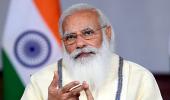June 25, 1975, when most Indians today were not born, Prime Minister Indira Gandhi imposed a state of Emergency on the country.
Democracy was suspended for 19 long months and India was reduced to a tin-pot dictatorship.
Today, distinguished commentator Inder Malhotra notes that the Emergency established that India would be governed, to the extent it can be governed, democratically or not at all.
No one with any claim to rationality would dispute that the Emergency in the mid-seventies of the last century was a sordid chapter in modern Indian history. With a single stroke of the President's pen on the night of June 25, 1975, the world's largest democracy was reduced to a tin-pot dictatorship, one of the many then infesting the Third World.
To those of us who lived through it, the Emergency was a 19-month nightmare. It took an excruciatingly long time to flush out of the system the poison it had pumped into the body politic. In my biography of Indira Gandhi, published in 1989, I had called it 'her worst mistake, indeed cardinal sin.' There is no reason to change that opinion.
No fewer than 100,000 people were arrested and detained indefinitely without trial; many times that number was harassed mercilessly. What a hammer-blow it was to people's liberty as democratic decencies were chillingly underscored in the Supreme Court, by then totally pliant to the prime minister.
The bold and lone dissenter on the bench, Justice H R Khanna, asked Attorney General Niren De whether a citizen had any remedy against being shot by a policeman for no rhyme or reason. 'My Lord,' replied De, 'my conscience is revolted, but under the law at present there is no remedy.'
Yet I would be lacking in objectivity if I fail to take note of how the perspective on the Emergency has changed over the 35 years that have elapsed since then. This process may have been gradual but its outcome was brought home to me vividly at the time of Indira Gandhi's 25th death anniversary on October 31 last year.
From the late sixties up to long years after her assassination the bulk of the Indian intelligentsia was unwilling to listen to any good word about her. Last October its attitude was remarkably different. To be sure, in the talkathon on television channels and articles covering acres of newsprint, a few commentators did consider her 'irremediably evil' just as an equally small number held that she had done no wrong because she could do no wrong.
However, the majority opinion of her was notably positive. Even those who declared that they would never forgive her for imposing the Emergency conceded that though she had indeed sinned, politically speaking, she was also sinned against.
Indeed, there are signs of a growing consensus that the Emergency was 'scripted jointly' by her and JP, as Jayaprakash Narayan was called by one and all. The country's premier sociologist, Andre Beteille, historian Bipan Chandra and scholar Ramchandra Guha agreed that the 'anarchy' that JP was promoting and the 'authoritarianism' of Indira Gandhi and her son, Sanjay, were the 'two sides of the same coin.' Some others ask whether the saintly JP was justified in 'inciting' the armed forces and the police to disobey the government.
There are other reasons for the changing view of the Emergency. A very important one is that much more than half the country's population was born after 1975. It knows little about the Emergency and cares even less. Moreover, with the passage of time, people are realising that governments are capable of doing terrible things without a formal proclamation of the Emergency.
After all, what is the difference between what happened at Singur and Nandigram recently and the Turkman Gate incident in Delhi during the Emergency, or between the officially tolerated depredations of Haryana's khap panchayats today and the forced vasectomies during the Emergency's 'dark days'?
There is no doubt that Indira Gandhi did use the Emergency to inflict lasting damage on the institutions that provide the underpinning to democracy by suborning or subverting them. Ironically, these were founded and nurtured by her even more illustrious father. But the question is whether she alone has to be blamed for this depressing development.
In the first place what did the heads of the august institutions, whose job it was to safeguard the integrity and autonomy of the organisations they presided over, do. They happily succumbed and bent over backwards to comply with the Emergency regime's dictates.
In 2005, eminent lawyer Fali S Nariman wrote an article in which he pitilessly exposed the highest judiciary's feet of clay. A week before the Emergency was clamped down, as additional solicitor general (a job from which he resigned immediately after June 26) he appeared in a detention case on behalf of the government. The three-man bench, headed by A N Ray, who had just become chief justice by superseding three brother judges senior to him, lectured him sternly on the 'citizen's rights and liberties.'
After the Emergency all three changed their lofty stand 180 degrees. As for the press, the nation's watchdog, it is impossible to improve upon the remonstrance to it by L K Advani, information minister in the Janata government: 'You were asked only to bend but you chose to crawl.'
It is even more worrisome that though there have been ten prime ministers after Indira Gandhi, including Morarji Desai and Atal Bihari Vajpayee, none of them has done anything to restore the autonomy of languishing institutions. On the contrary, the current plight of these is much worse today than in her time.
For instance, the Vajpayee government cynically used the CBI for its political and partisan purposes. Under Manmohan Singh the premier investigative agency has earned the nickname (Congress Bachao Institution).
A vital fact we must all ponder is that when the Emergency was announced (though it had gone into force in secrecy on the previous midnight) there was absolutely no protest against it, never mind resistance to it. For a whole year, thanks to the JP Movement, almost the entire country, from one end to the other, was screaming that Indira Must Go. The press was also baying for blood. But when the hammer-blow actually fell, there was dead silence. No wonder, the prime minister told a confidant: 'Not a dog barked.'
In custody at New Delhi's All India Institute of Medical Sciences, JP told his captors that the capital city was burning but the censors were suppressing the news. They seated him in a luxury car with windows made of one-way glass and drove him through most parts of Delhi. He returned to his hospital bed a dejected man.
On the Emergency's overview, I cannot do better than quote a friendly and objective foreign observer, Granville Austin, who has written a seminal book on the working of the Indian Constitution. In it he candidly states that the Emergency was imposed for the purpose of 'saving one individual's office,' and goes on to say that its imposition was 'not utterly without justification. Opposition parties' frustration had boiled over. The two sides' behaviour had combined to stretch democracy until it snapped.'
He also wrote: 'Ugly as the Emergency was, New Delhi in 1976 was not Berlin under Adolf Hitler,' to which one might add, 'Nor Moscow under Stalin, Beijing under Mao, Santiago under Pinochet or Islamabad under Zia-ul Haq.'
Also it is a comment of sorts on the Emergency, because of which Indira Gandhi suffered a humiliating defeat in the 1977 general election that she was back in power spectacularly in 30 months flat although in Vajpayee's words, she had been 'consigned to the dustbin of history.'
The final and reassuring point about the Emergency is that it cannot be repeated. Leave aside the Constitutional safeguards and the hugely changed configuration of political forces. The material fact is that if Indira Gandhi's Emergency proved anything at all, it established that India would be governed, to the extent it can be governed, democratically or not at all.
Inder Malhotra is a distinguished journalist and the author of Indira Gandhi: A personal and political biography.









 © 2025
© 2025